Zero Woman (continued)
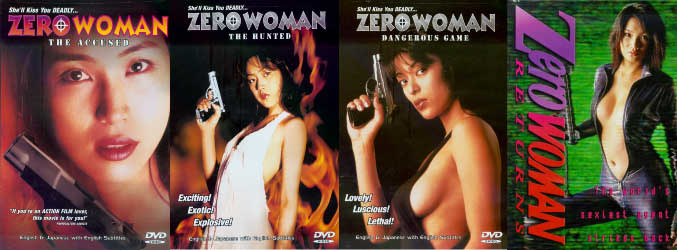
Zero Woman: The Accused (1996)
Daisuke Goto who directed the second in the Zero Woman series is back
for this one, but he takes a very different tack here. There is very little
action and really no action choreography to speak of. This is more an intrusion
into the dark places of her damaged psyche. Part of this may be simply that
there was no budget to work with as it looks very bare bones – with much
of it taking place in a few interior locations – her sparse apartment and
a bar. She again appears to be on the edge of mental dissolution – after
each kill she goes to a bar and drinks herself into a stupor and looks for
some quick comfort in the night. After one such assignment she finds herself
attracted to a young androgynous looking bi-sexual male hooker and takes
him into the alleyway with a sense of urgency – “I need to connect with someone”.

Zero Woman (Mai Taichira) has no social interaction anymore and is even forced
to move to a new apartment after each kill and start over again. So one night
when she sees the male hooker Mitsuru (Yujin Kitagawa) beaten up by some
other boys in the same trade she takes him home like a stray cat and tends
to him. At one point he asks Rei “Are those your real breasts?” – a question
that one could ask of many of the Zero Women. Her next assignment is to find
out whatever she can about an official at the Foreign Ministry who is suspected
of selling information to third parties. She manages to become friends with
his mistress and finds out that in fact he is trading secrets and that he
is skipping the country. In the best moment of the film, she asks him how
many plane tickets he bought – hoping that he is taking her newfound friend
– but when he replies “one” he becomes expendable in her eyes.

In a seeming plot jump, she comes across a serial killer taking out male
John’s – and she becomes a suspect when she is found holding the knife. It
turns out that the cop who questions her had once asked her out for a date
at the police academy – but one day she had just disappeared – to become
Zero Woman! The trail not surprisingly leads to her door where she is keeping
Mitsura out of harms way. Even at a short 73 minutes running time, this one
feels draggy to me – too introspective for its own good but an interesting
attempt to break the mold of the series. As far as I can find out Mai Taichira
hasn’t appeared in anything else besides this film.

My rating for this film: 5.5
Zero Woman: The Hunted (1997)
There are some potentially good ideas and good scenes in this one,
but the entire film is executed with such lethargy and lack of spark that
it becomes tedious to sit through. Almost dozing off in the middle of a shoot
out is not a good sign. For example, the film begins with a scene that in
more competent hands should have been one of the better action set-ups in
a Zero Woman film. Rei (Mikiyo Ohno) is ordered to kill a well-protected
German visiting Japan and does this by getting invited to a pool party. She
swims underneath him and uses a wire garrote to finish him off while his
many bodyguards are unaware of what is happening. She then has to shoot her
way out (though stopping apparently to change into an evening gown) – and
escape the clenches of a gigantic muscleman who can’t decide whether to kill
her or have sex with her. It is all so poorly staged and choreographed though
that it never manages to raise your Girls with Guns pulse an iota. Rather
than going to a bar to find a man as she did in a previous film after a kill,
her handler sends a man to her door to service her. True room service, but
she declines.

There are various threads to the narrative. In one an assassin is sent to
kill her but unlike in “Assassin Lovers” no romance blooms between these
two – only bullets. In another thread she begins ordering spaghetti at a
restaurant and piling ketchup on top of it – it must be this little quirk
that catches the attention of the very cheerful waiter who begins to court
her. She hardly knows how to respond. Finally, one day she sees a woman who
is harassed by a group of men and she reminds her of someone see once saw
raped as a young girl. She follows her to the woman’s workplace – a spa -
out of curiosity and gets a message from her. She notices a few scars that
affirm that this is indeed the same woman, but unknown to her the woman has
a sideline – assassination – by rubbing poison on her breasts and allowing
her victim to lick them. All these threads end up colliding and leading to
the death of many of them. At the end she says for the hundredth time perhaps
“I have yet another memory that cannot be erased”.

Besides the poor pacing of the film, the shot on video look seems the most
obvious of any of the Zero Woman films with its flat uninteresting look.
Actress Mikiyo Ohno is pouty attractive but looks too soft and less endowed
than normal to be taken too seriously as a Zero Woman. Born in 1974, Mikiyo
began in show business as a singer in a popular teen idol band called “Coco” that released a
few albums, but after they broke up she appeared in Zero Woman and has been
in numerous TV shows since.
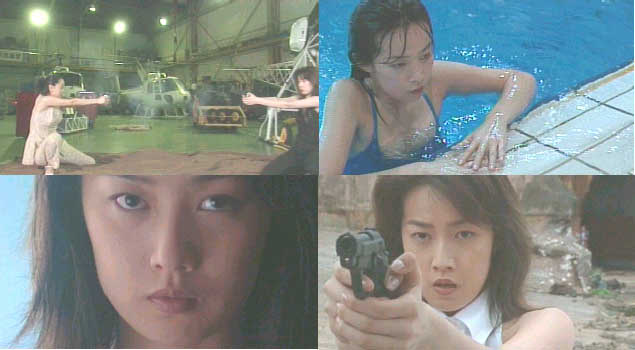
My rating for this film: 5.0
Zero Woman: Dangerous Game (1998)
Just as it appeared the series was going straight to video hell, it
bounces back with perhaps the best film in the series. Laced with straight-faced
macabre humor, this quirky rendition is full of interesting characters, gore
and loads of sex appeal. Director Hidekazu Takahara brings back some much
needed style as he uses some quick editing to give it some snap and various
filters to give it a changing look. What really sets it apart though is the
enormously fissionable presence of Chieko Shiratori. She radiates sex appeal
and maturity with her tall statuesque build, long legs, slightly hooked nose
and voluptuous body (she reminds me somewhat of the Chinese actress Diana
Pang Dan). These looks have earned her photos all over the Internet and roles
in a few other films as well (Bloody Justice, Tokyo Blue: Case 1, Birth of
the Wizard 2, Metropolitan Police Branch 82).
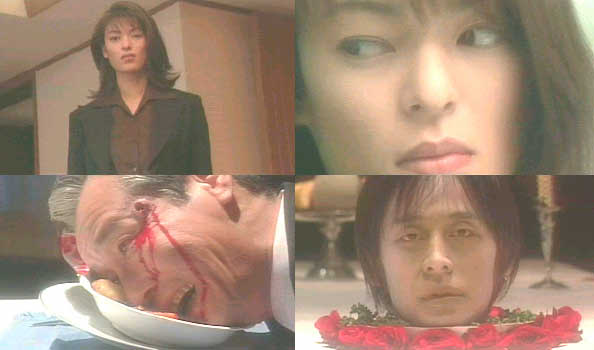
One doesn’t have to wait long to see these features, as the film opens with
her in the bath and then walking nude to the refrigerator to take a cool
swig of milk from a bottle. Her apartment as in all of the Zero Woman films
is shoddy and unkempt – a way station till her next move. Organized crime
is having a field day with stealing organs from recently living people for
the right price and Rei is assigned to put a stop to it. She tracks some
of them down to a meat factory where a medical examiner and some henchmen
are in the process of joyfully cutting up a body with blood squirted on them
like a modern art canvass. The scene is shot intentionally in grainy stock
that gives it a noirish feel as Rei methodically kills them – the last one
standing is the medical examiner, but not for long – her diagnosis “Cause
of death. Shot to the head”. Afterwards she offers her handler (Daisuke Ryu
– who takes on these duties in the last three films in the series) sex, but
he refuses by telling her that she is a Zero, not a woman. He should have
seen her drinking that milk!

The man behind the organ smuggling is Kaneda (Masayoshi Nogami), the most
outlandish villain in the series by far – an older man who likes to dress
up in women’s clothes and dance with his male lover in front of his gang.
He also believes in laughing and makes his men practice it each day. In his
spare time he also had a female mistress, Nana (Ichiho Matsuda) but she has
gone to the cops to ask for witness protection. After an assassin almost
gets to her before Rei kills him, Rei brings Nana to her apartment to protect
her and to keep an eye on her because she doesn’t trust her motives at all.
Ichiho (who is a nude model) does a great job with this character as she
gives her a cheap non-stop talker/whiner spunkiness that is eventually quite
charming.

Rei wants nothing to do with her at first but eventually she warms up to
her and they become friends – make that very very good friends. They take
on near gender roles here as Nana cooks and chats while the always serious
Rei says little and dresses in buisness suits or jeans and sneakers. When
they have sex, it is displayed with emotional passion and gentleness - the
only sexual scene in the series that is depicted in this manner. Much of
the film simply becomes the friendship that develops between these two women
as they sit around and eat and talk of various things such as masturbation
and their lives. One expects this peaceful interlude to be broken up at any
moment by an attack, but it goes against your expectations in this regard.
There are a few violent moments thrown in – one a bizarre trip to an insane
asylum to kill a doctor - but much of the final two thirds of the film almost
feels like a French film about female relations. Then Zero Section decides
Nana is of no value to them and orders Rei to cut her loose.
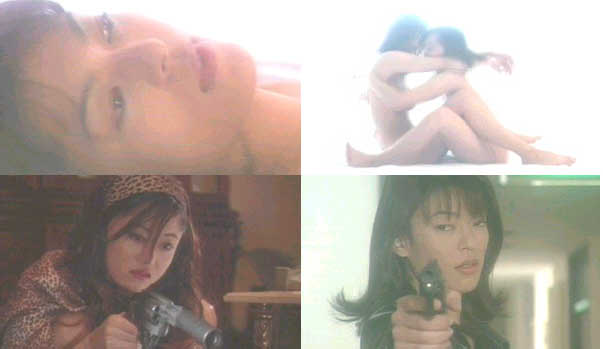
My rating for this film: 6.5
Zero Woman: Returns (1998)
Released in 1998 this seems to have brought the series to a close -
at least for a while. Hopefully, Zero Woman will make an appearance again
someday as there are always new bad guys that need killing. Though these
films are low budget, trashy and rarely very interesting, they do have an
intriguing premise in the character of Zero Woman – a portrait of modern
day angst, nihilism and isolation in a society where all the social connective
bonds are slowly dissolving. Unlike other cinematic female assassins that
she is patterned somewhat after like La Femme Nikita or Black Cat, she has
no real life away from her work and is not allowed to have one by her government
– she is simply a near fascist tool to be exploited and discarded when the
time comes and she is very aware of this. It would be great to see a version
made with a real budget and an action director like Ryuhei Kitamura.

After the last one played around with the Zero Woman conventions to good
effect, this film disappointingly takes those conventions and holds them
near to their heart and so there isn’t too much new here. The film begins
again with a killing – in a parking garage where so many low-budget action
scenes have seen life over the years. In her sleek silver raincoat and matching
revolver, she kills three cocaine dealers and goes home to shower. This Rei
is more cheerful than normal (even taking batting practice on one occasion)
– and she tries to take on outside employment to kill the time between assignments,
but her Zero Woman duties always force her to leave eventually. One of these
short-lived jobs is working for a plant shop and she is asked to deliver
a Silk Jasmine to an office building. There she meets Hideo, the head of
the company, and she is attracted to his enthusiasm for this specific type
of plant.

Perhaps not so co-incidentally she is called in by her handler (Daisuke Ryu)
and given a new assignment – to get close to a man suspected of being involved
in stealing drugs and guns from police confiscation – the man is of course
none other Hideo. So she sets out to seduce him – not a very difficult job
in her swimming suit and soon he offers her a job – but not as an office
lady but instead as he says for something dangerous and well paid – a courier.
She accepts. After successfully completing a few difficult tasks for him,
they become romantically involved and have fun comparing old bullet wounds.
The word comes down from Zero Section though that he is now no longer of
value and must be deleted. She has other thoughts. There is a fair amount
of action in this one and actress Saori Ono has a pug-nosed sexiness that
is hard to resist, but overall it simply feels too predictable and genre
bound.
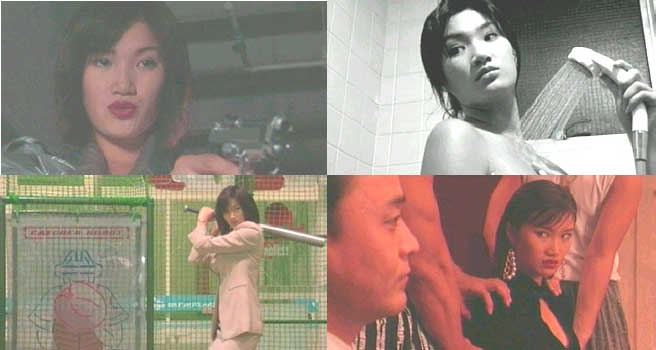
My rating for this film: 5.5














